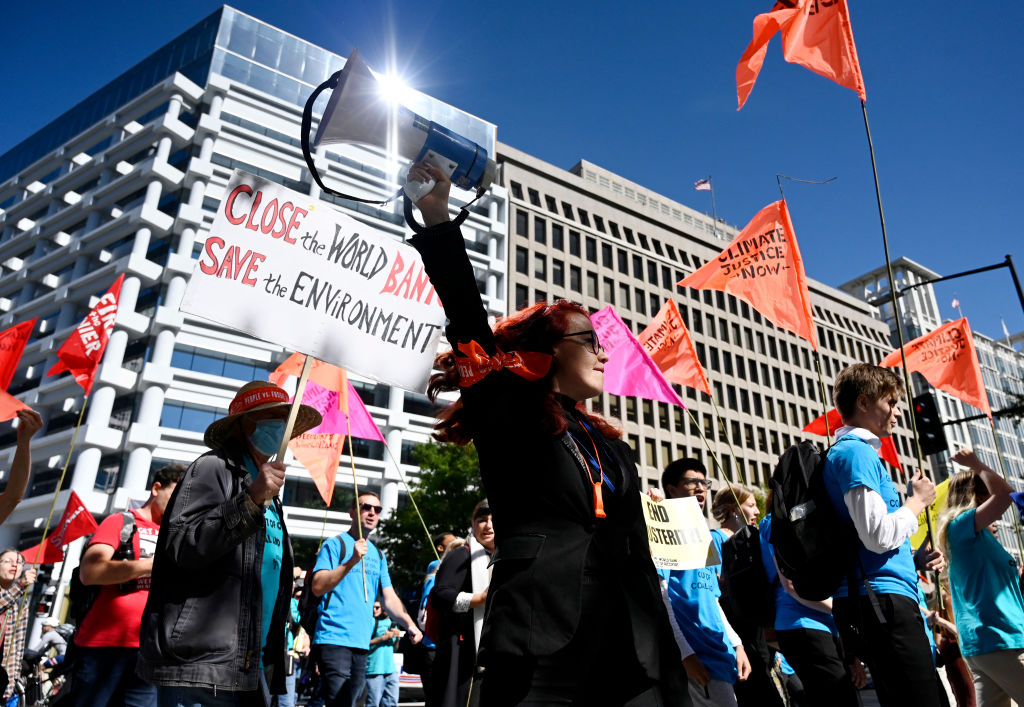
When David Malpass, president of the World Bank, was asked point-blank in September if he accepts the scientific consensus that the burning of fossil fuels is dangerously warming the planet, he dodged the question multiple times before finally responding “I am not a scientist.”
These days you don’t have to be a scientist to recognize the clear connection between burning coal, oil, and gas and the climate-fueled flooding this summer in Pakistan that killed nearly 1,500 people, displaced hundreds of thousands, and fueled an outbreak of waterborne illness. Or the catastrophic flash floods Hurricanes Fiona and Ian unleashed on Puerto Rico and Florida in the past few weeks. Many of the people most impacted by the climate crisis reside in countries served by the World Bank.
In the public furor that erupted in the weeks since, Malpass walked the comment back, proclaiming, “I’m not a denier,” and even trying to defend his position during the World Bank meetings in Washington, DC, last week. The trouble is, it’s not his statements that are actively driving climate devastation. It’s Malpass’ own record. Analyses indicate that over $1 billion dollars in World Bank funding have gone toward fossil fuel projects since Malpass became president. And while the World Bank’s stated mission is “to end extreme poverty and promote shared prosperity,” its continued funding of fossil fuel projects fails to account for the impacts that climate change is already having on the global economy. In 2021, extreme weather and climate-related events led to nearly $240 billion in global losses.
Malpass is not alone. Multilateral development banks (MDBs)—like the World Bank—have extraordinary influence over the global energy sector, effectively determining what kinds of projects can and can’t be built. And while they commit to aligning with the goals of the Paris Agreement and tackling the climate crisis publicly, they effectively deny it in practice, providing an estimated $18 billion in financing for fossil fuel projects from 2018–2020 alone.
We are out of time for this one step forward, three steps back policy from the world’s financial institutions. Last month, as Malpass equivocated, a report co-authored by the International Energy Agency projected the world would need at least $1 trillion in annual investments in renewables by 2030 to accelerate energy transition on the scale and at the pace necessary to avert climate catastrophe.
Signals matter. Especially coming from the world’s pre-eminent MDB. Malpass indicated that he’d welcome meeting with climate scientists. Is it conceivable that he hasn’t even met with experts in the field or is ignorant to the consensus scientific reports of the Intergovernmental Panel on Climate Change? Malpass has had years to live up to the World Bank’s stated commitment to end financing for fossil fuel projects in all but exceptional cases. Instead, he’s used the Bank to slow walk the energy transition we so desperately need to stop warming and give the planet any shot of preventing the worst of climate change. His delay has contributed to millions already suffering through rising droughts, storms, floods, and more – and millions more in the years ahead.
We need real leadership on the climate crisis from the World Bank and other MDBs. Especially with the UN’s critical COP 27 climate conference fast approaching and an opportunity for global finance to supercharge the just transition to clean energy already underway. Change has to start at the top. Malpass had his chance to lead and passed. It’s time for a new way forward—and a new World Bank president.
More Must-Reads from TIME
- How Donald Trump Won
- The Best Inventions of 2024
- Why Sleep Is the Key to Living Longer
- Robert Zemeckis Just Wants to Move You
- How to Break 8 Toxic Communication Habits
- Nicola Coughlan Bet on Herself—And Won
- Why Vinegar Is So Good for You
- Meet TIME's Newest Class of Next Generation Leaders
Contact us at letters@time.com